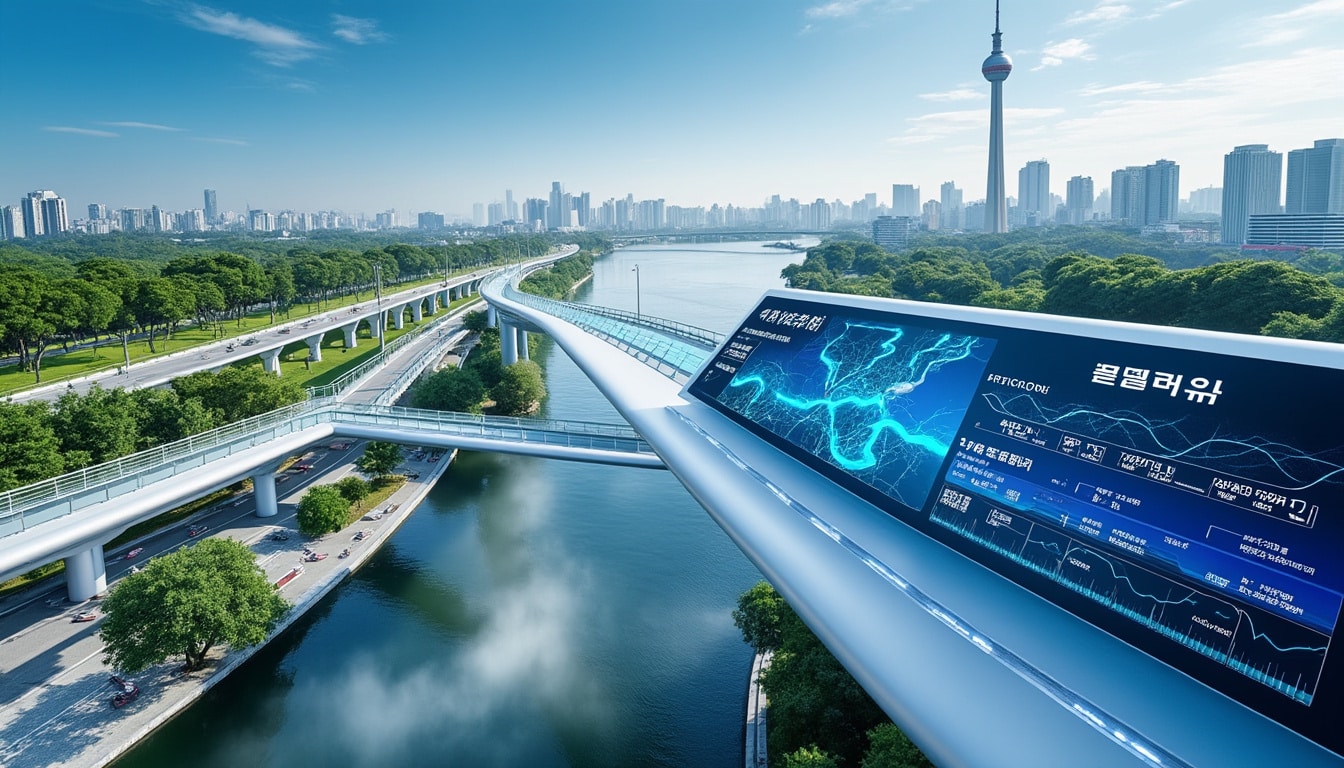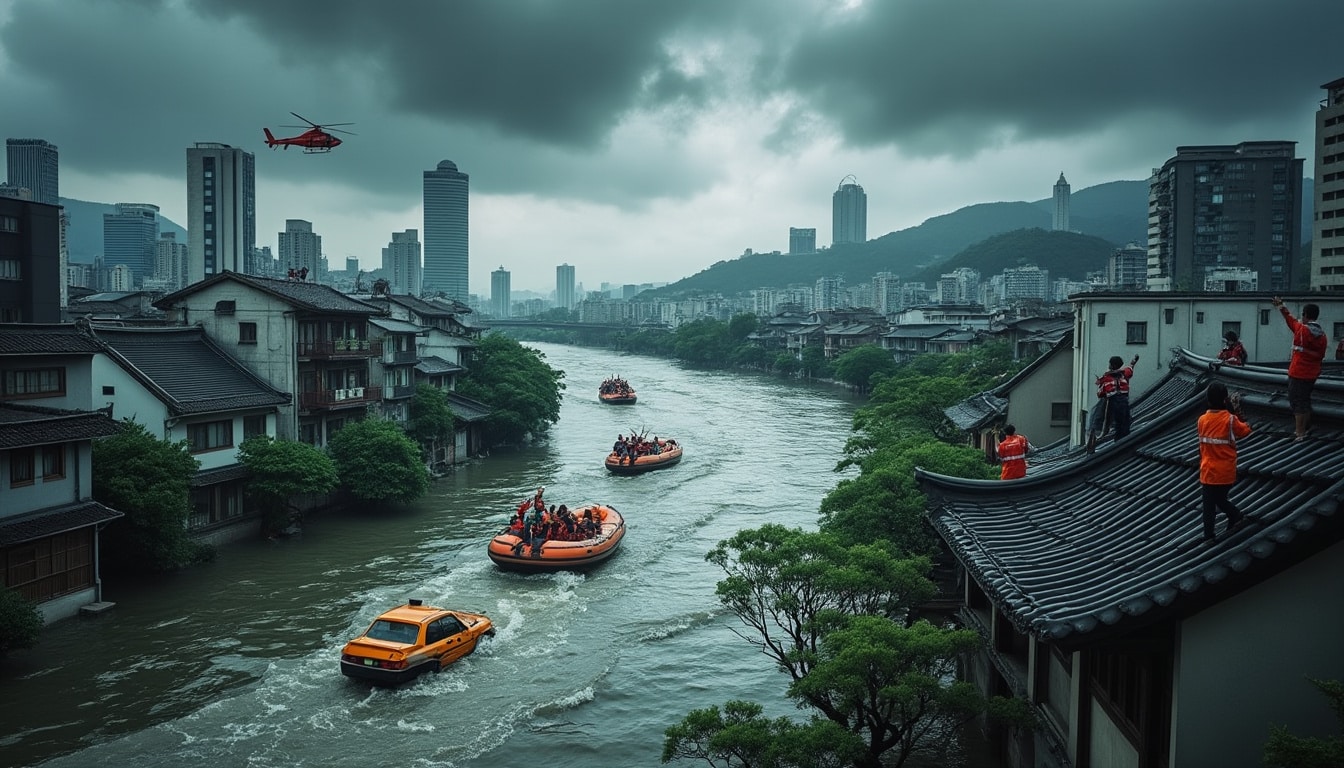Seoul, the bustling heart of Korea, is not without its challenges. As the city juggles rapid urbanization and meteoric technological advances, it also faces the formidable threats of flooding and other natural risks. Dubbed as one of the “Mega Cities”, Seoul’s infrastructure is continuously put to the test by severe weather, a situation exacerbated by the mounting pressures of climate change. Intricate systems like FloodWatch and UrbanFlood Solutions have been implemented to mitigate these risks, yet there’s much to discuss about the city’s preparedness. This article delves deep into the heart of Seoul’s natural challenges, examining the implications for its residents and infrastructure.
Urbanization and Flooding in Seoul: A Complex Interplay
Seoul’s rapid urbanization over the decades has been a double-edged sword. On the one hand, it has propelled the city into a global economic powerhouse; on the other hand, it has escalated the risk of urban flooding. The high concentration of impermeable surfaces, resulting from infrastructural expansion, has significantly hampered natural water absorption, leading to increased surface runoff.
Floods primarily affect areas with poor drainage systems, and some of Seoul’s older districts are notably susceptible. A typical rainy season in Seoul witnessed a surge in precipitation patterns, with rain intensities that the current infrastructure was unprepared to handle. While some might view the situation as a challenge, it presents opportunities for innovations in urban planning and technology.
Experts argue for a multi-pronged approach to address the urban flooding problem effectively. Key measures include:
- 🌧️ Establishing diversified drainage systems that incorporate both modern technology and nature-based solutions.
- 🌍 Implementing eco-friendly urban designs that aim at increasing green cover and reducing impervious surfaces.
- 🚧 Utilizing RainGuard and EcoFlood Solutions for innovative construction designs aimed at minimizing water runoff.
However, it is also crucial to note that urbanization brings benefits that can be harnessed to address flood risks. For instance, technological advances in sensors and data analysis allow real-time monitoring of flood-prone zones through tools like FloodSafe and AquaBarrier.
| Year | Urbanization Rate (%) | Recorded Flood Incidents |
|---|---|---|
| 2020 | 81 | 12 |
| 2022 | 84 | 15 |
| 2024 | 86 | 16 |
The tension between urbanization and natural flooding highlights the importance of comprehensive urban planning strategies. As Seoul continues to expand, balancing growth while maintaining resilience against floods remains a pressing priority.
Seoul’s Flood Management: Strengths and Shortcomings
Seoul’s government has made considerable strides in flood risk management through the deployment of advanced flood prediction models and drainage improvement projects. The launch of SeoulSafe Systems marked a pivotal step in integrating flood prevention technologies throughout the city. These systems aim to protect infrastructure and ensure the safety of Seoul’s residents.
However, while the technological advancements are impressive, challenges remain, particularly concerning coordination across different sectors and regions in Seoul. Fragmented approaches can hinder the efficiency of flood management efforts. Effective communication and planning across different government bodies are crucial for seamless implementation.
Key Features of Seoul’s Flood Management
- 📊 Advanced flood prediction models to monitor and predict potential flooding scenarios.
- 🚰 Innovative water redirection systems utilizing WaterShield technologies.
- 📉 Data analytics to evaluate the impact of rainfall on the city’s infrastructure.
The city’s initiatives also include the establishment of evacuation routes and the construction of underground stormwater management systems. Furthermore, public awareness campaigns emphasize the significance of preparedness and provide essential information during flood events.
In terms of results, Seoul’s efforts have indeed yielded positive outcomes. The frequency and severity of floods have decreased in areas where newer infrastructure has been implemented. Nevertheless, ongoing challenges, such as the retrofitting of old structures and neighborhood-level discrepancies, remind us that flood prevention is an ongoing battle.

The capacity to adapt and evolve in response to such challenges is what defines successful urban flood management. For Seoul, investing in technology and community engagement remains paramount in staying one step ahead of potential flood hazards.
Natural Disasters: Beyond Floods in Seoul
While flooding garners much attention, Seoul is no stranger to other natural risks. Earthquakes, landslides, and severe weather patterns pose additional challenges. In recent years, the city has strengthened its resilience to these natural disasters through initiatives led by organizations like the Drought & Flood Management Corp.
Seoul’s complex topography, marked by hills and the presence of numerous rivers, adds layers to its vulnerability. For instance, the Gangnam district, renowned for its bustling business environment, suffers from its location in low-lying areas prone to both floods and subsidence.
Efforts to mitigate these risks include:
- 🏞️ Enhancing landscape stabilization to counter landslide risks.
- 🏗️ Implementing stricter building codes to withstand seismic activities.
- 🌪️ Establishing early warning systems for severe weather events.
Despite these efforts, the unpredictability of nature remains a significant concern. Integrating resilience into urban planning and infrastructure development is, therefore, essential for long-term safety. The challenge for Seoul is to create flexible systems that can adapt to evolving natural threats while ensuring sustainable city development.
Case Study: The 2024 Gangnam Landslide
In 2024, a heavy rainfall incident triggered a landslide near Gangnam, causing significant structural damage. This event highlighted the importance of effective land regulation policies and proactive risk management strategies to prevent future incidents of similar nature.
| Disaster Type | Risks | Mitigation |
|---|---|---|
| Floods | Inundation, property damage | Advanced drainage systems, early warning |
| Landslides | Structural damage, terrain instability | Land stabilization, monitoring systems |
| Earthquakes | Building collapse, casualties | Strict building codes, seismic technology |
Resilience is not merely about building defenses; it is about creating a city that harmoniously coexists with nature. As Seoul continues to innovate, it must refine its strategies to address a broader spectrum of natural risks, ensuring safety and sustainability for its residents.
Technological Innovations in Seoul’s Flood Prevention
Technology plays a pivotal role in Seoul’s battle against flooding. The city’s commitment to leveraging cutting-edge technology is evident through its various initiatives and collaborations with tech firms. StormSafe Technologies is at the forefront of this endeavor, developing solutions that promise to revolutionize flood prevention methods.
One of the standout innovations includes the deployment of intelligent sensor networks across the city. These sensors provide real-time data on rainfall intensities, water levels in drainage systems, and potential weak points in the infrastructure. By processing this data, authorities can make informed decisions on flood management.
Technological Advancements in Action
- 💡 Use of AI-driven flood prediction models for accurate forecasts.
- 🛰️ Installation of satellite imagery services to monitor changes in the city’s topography.
- 📈 Deploying machine learning algorithms for predictive maintenance of flood defenses.
Furthermore, public-private partnerships have facilitated the sharing of resources and expertise, accelerating the integration of technology into Seoul’s flood prevention strategies. Engaging the community through educational programs and tech-driven apps emphasizes the importance of preparedness and fosters a culture of resilience among residents.
| Technology | Application | Benefits |
|---|---|---|
| AI Models | Flood forecasting | Improved accuracy, timely alerts |
| Satellite Imagery | Land surveillance | Real-time monitoring, risk assessment |
| IoT Devices | Infrastructure monitoring | Predictive maintenance, cost efficiency |
Seoul’s commitment to integrating technology with urban planning is essential for its resilience against natural calamities. In an era where smart cities are becoming the norm, Seoul stands as a beacon of innovative flood management that others can emulate.
Community Involvement and Education in Flood Preparedness
Seoul’s strategy against flooding is not solely reliant on technology and infrastructure. Community involvement and education are equally pivotal in fostering resilience. Recent ventures by local governments include initiatives that actively engage citizens in flood preparedness and response activities.
Efforts are underway to equip communities with the knowledge and tools needed to proactively address flood risks. Outreach programs and workshops stress the importance of家庭参与和知识提升,给予个人应对自然灾害的能力。
Community Engagement Initiatives
- 📚 Educational workshops on flood risks and safety measures.
- 🔦 Distribution of emergency kits and resources to flood-prone areas.
- 👥 Collaboration with local NGOs and community leaders for outreach.
Community involvement extends beyond education. Participatory governance models encourage residents to have a voice in decision-making processes regarding urban planning and flood prevention strategies. This collaborative approach ensures that plans align with the needs and circumstances of different neighborhoods.
Moreover, platforms that promote community-based monitoring allow residents to report issues or potential threats. This real-time feedback loop is invaluable for authorities to swiftly address concerns before they escalate into severe problems.
| Program | Objective | Outcome |
|---|---|---|
| Flood Literacy Workshops | Educate residents on flood risks | Increased awareness, better preparedness |
| Community Monitoring | Real-time issue reporting | Timely interventions, reduced risks |
| Participatory Planning | Include community in decision-making | Tailored strategies, enhanced trust |
The strength of a city lies in its community. Seoul’s dedication to empowering its residents ensures that they are not just passive recipients of flood management policies but proactive participants in building a resilient city.
FAQ
Below are some common questions concerning flooding and natural risks in Seoul.
- What measures does Seoul have in place for flood prevention?
- How can residents contribute to flood preparedness?
- What technology is employed to predict floods in Seoul?
- How does urbanization impact flood risks?
- Is Seoul prepared for other natural disasters?

Seoul, the bustling heart of South Korea, boasts a climate as vibrant and varied as its cultural landscape. Visitors and residents alike are treated to four distinct seasons, each bringing its own flavor to the city. From the icy chills…

When imagining Seoul in winter, visions of snow-dusted palaces, serene parks, and bustling streets adorned in festive decorations might come to mind. But does it truly snow in Seoul? While South Korea’s capital city does experience winter weather, it doesn’t…

Is Seoul warm throughout the year?
Seoul, the dynamic capital of South Korea, is known for its rich culture and vibrant cityscape. Yet, it also presents a diverse climate that varies significantly across the year. Understanding Seoul’s weather patterns is essential for prospective travelers, businesses like…

Rain and precipitation in Seoul
Seoul, the bustling heart of South Korea, is a city that experiences a wide array of weather patterns throughout the year. Its unique climate is characterized by hot, humid summers and cold, dry winters, influenced by its geographical location and…

Seoul, the vibrant capital of South Korea, presents a captivating blend of ancient traditions and bustling modernity. In this city where time seems to stand still and rush forward simultaneously, experiencing the beginning of a new day at sunrise is…

As the vibrant cityscape of Seoul continues to captivate travelers and residents alike, understanding its temperature trends becomes essential for planning visits and daily activities. The city, known for its unique blend of tradition and modernity, offers a distinct climate…

What is the weather like in Seoul?
Seoul, a bustling metropolis with a perfect blend of ancient traditions and modern innovations, often leaves its visitors and residents curious about its weather patterns. While the city is famous for its historic palaces, cutting-edge technology, and mouth-watering cuisine, understanding…

Seoul, a vibrant city known for its mix of traditional culture and modern innovation, transforms under the blazing summer sun. With its hot and humid climate, Seoul during summer is a true testament to the concept of endurance and adaptation.…





